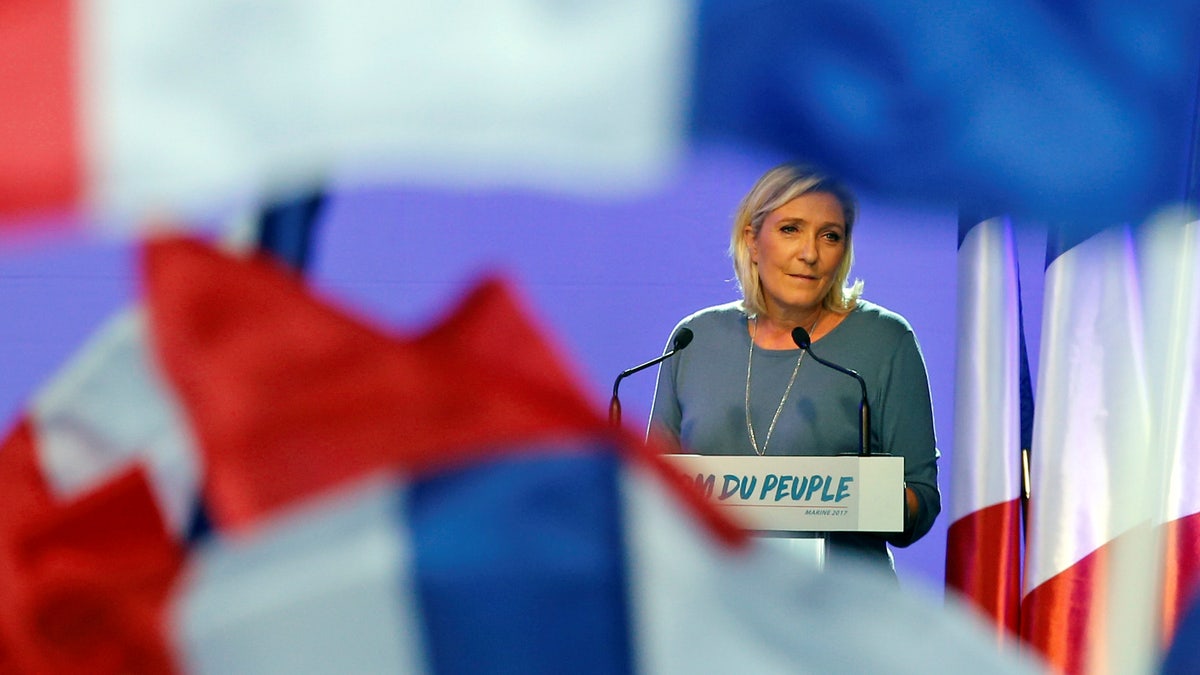
September 18, 2016: French National Front (FN) political party leader Marine Le Pen delivers a speech during a FN political rally in Frejus, France. (Reuters)
In HBO’s “Westworld” -- about a Wild West theme park populated by robots -- there is a scene in which a robot character unloads his pistol at a human “guest.” When the approaching human shrugs off the bullets (one of the rules is that no robot can harm a human), the robot gawks in disbelief. Yet instead of trying something new, he merely reloads and keeps impotently shooting.
The scene is an accidental, yet perfect, metaphor for the situation in Western Europe and the USA right now. The approaching human is the quiet revolution sweeping through both continents, while the media, financial and political elites are the gawking robots, unaware that the rules of the game have changed and unable to do anything other than keep reloading the same pistol and firing the same shots.
First Brexit, then Trump, and now it seems like the Western Revolt could sweep through the halls of power in Austria, Italy, France and Germany by this time next year. Yet the elites are still reloading and firing the same pistol, hoping that this bullet this time will stop the approaching threat.
Out of all the political events to keep a track of right now, France’s presidential race should be at the top of your list. On Sunday, former Prime Minister François Fillon -- a hardline conservative calling for budget cuts and small government -- beat off pollsters’ initial favorite and moderate Alain Juppé to win the Republican Party nomination. This means that in April Fillon will be the favorite against the woman who has the French elites quaking in their loafers -- the National Front’s Marine Le Pen.
Le Pen, running on a nationalistic, anti-Islamist, anti-globalization, anti-third world immigration platform, is expected by many experts to win the first round of voting in April when there are multiple candidates on the ballot, but ultimately lose in a second round head-to-head with Fillon -- the theory being that left-wingers and centrists will unite behind the more moderate Fillon against the “hard-right” Le Pen.
Yet the assumption that Le Pen slots into the “hard-right” category (and therefore holds no attraction to left-wing and centrist bases of support) is flawed, and is the same logic that led American and British pollsters to undervalue the appeal of similar movements to working class voters in places like Sunderland and Michigan.
Le Pen’s revolution has been building slowly for years since her ascent to the leadership of the National Front in 2011, when she cleaned the party out of its most hateful elements in a “de-toxification” process. A hardliner on immigration and Islamism, she is moderate on gay marriage and abortion, skeptical of free trade deals, in favor of increasing taxes on the rich and opposed to harsh austerity measures. Like Trump, therefore, it is hard to lock her into a typical left/right category.
A brief glance at France in 2016 tells you why her message is so appealing to even moderate voters. After being hit by brutal Islamist terror rampages in Paris and Nice, the country is going through another crisis after the deconstruction of the “Jungle” refugee camp in Calais. As a result, third-world migrants have flooded the streets of Paris, setting up new makeshift camps down the Champs-Élysées. Meanwhile, five Islamists were arrested last week after an “imminent” terror plot was uncovered.
The migrant and terror crises, along with a high unemployment rate, have shot socialist President Francois Hollande’s reputation -- whose approval rating now stands at just four percent (no that’s not a typo.)
With Hollande’s reputation in tatters, Fillon’s call for austerity and cuts risks missing the mood of voters. While he is pushing a hardl line on immigration and Islam, calling on those coming into the country to assimilate, he has focused most of his message on deep spending cuts, a partial privatization of the nation’s beloved socialized health care system, and a raising of the retirement age.
Fillon is a smart man who has a successful career in French politics, so one should be careful before second-guessing him, and predictive polls for April (however unreliable) show him beating Le Pen comfortably. However, to pretend that what Le Pen supporters are yearning for is social security reform, and that left-wing voters unsure of the National Front will line up behind a harsh budget cutter seems a gamble indeed. It is far from certain that those who voted for Francois Hollande’s full-throated socialism just four years ago will now pick a privatizer and a budget slasher just because they are nervous about Le Pen.
Additionally, calling for harsh budget cuts to health care and pensions, while not going along with Le Pen’s call to exit the European Union and slam the border shut to migrants, hands Le Pen the golden ticket of being able to say to voters: “Fillon wants to cut your pensions and health care to pay for Muslim immigrants.” It is hard to think of message more likely to carry Le Pen into the Elysee Palace.
Whether Fillon or Le Pen wins, it will mark a remarkable and seismic rightward shift for the country either way. But should Fillon’s gamble that centre and left-wing voters will line up behind an ideological conservative not pay off, and Le Pen wins, the European Union will be thrown into crisis.
A President Le Pen would almost certainly join the U.K. in pulling the plug on its E.U. membership. While Britain’s likely departure has the unwieldy bloc teetering on the brink, France is one of the two core members (along with Germany) and so its departure would finally send the E.U. over the cliff, ending the post-war consensus of pan-Europeanism over nationalism with it.
Should this happen, the political, media and financial elites should not be allowed to say they could not see this coming. They have been warned multiple times about what would happen if they chose to keep borders open and put (often dangerous) foreigners above the needs of their own people.
And yet, just like the robot cowboy in "Westworld," they keep firing the same blank bullets from the same gun, hoping that maybe this time, somehow, there will be a different result and they will win. In France, they could again be sourly disappointed.








































